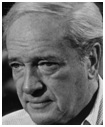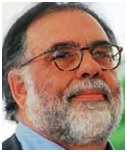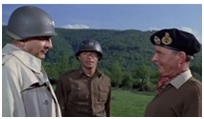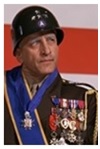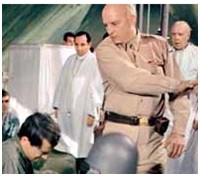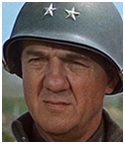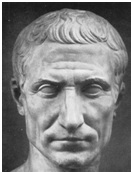|
 |
|
 |
|
|
||
Patton - Leadership and Communication
Patton (1970)
Famous for... Oscar winning George C. Scott’s portrayal of the American World War Two general, George Patton (1885-1945). Scott refused the award, comparing the Oscars to a “meat contest”.
Based on... The story of Patton’s World War Two leadership from two books:
Director Franklin J. Scaffner (pictured right).
Oscars Seven including:
Key characters George Patton (George C. Scott), American general. Omar Bradley (Karl Malden), American general. Bernard Montgomery (Michael Bates), British general (pictured right meeting Patton, on the left).
The story General George Patton gives an inspiring speech to his troops (pictured right) and then the film moves to Tunisia, North Africa, where he has taken over command of the American army, demoralized by a recent German defeat. With the help of the British (led by the equally egotistical general, Bernard Montgomery), he defeats the Germans (without their leader, Erwin Rommel). In July 1943 Patton:
Patton is relieved of his command after slapping a shell shocked soldier in an army hospital, calling him a “yellow bastard” (pictured right). This incident results in his exclusion from the D-Day invasion of Normandy. Instead (much to Patton's disgust) he is put in charge of a fictonal, decoy army in south-east England. After begging for another command, General Omar Bradley (his ex-deputy, pictured right below) asks him to lead the American Third Army. Patton brilliantly advances across France (including victory in the Battle of the Bulge)
and finally into Germany. He loses command of the Third Army after his controversial comments about;
Lessons for leadership
1. Be tough but tender Patton:
But he also:
2. Teamwork is vital He believed that a successful army is not a group of individuals (however talented or brave they are) but a team, which:
3. Winning is everything Victory at any cost is the theme of Patton’s opening speech. He believes that enjoyment is less important than:
4. Always attack the enemy He always told his troops to:
So he says: “Audacity, audacity, always audacity!”
5. Love leadership He was motivated by his love of fighting. Watching a battle he says: “I love it more than my life”. 6. Success is temporary After losing command of the Third Army, Patton says at the end of the film: “All glory is fleeting”. He is also reminded of this when he is not involved in the D-Day invasion. Religion helps him through difficult times. After disastrously slapping the shell shocked soldier, he prays in church, quoting Psalm 63 about God's love and support in battle. 7. Learn continuously Patton is a great student of military history particularly in ancient Greece and Rome. In Tunisia he visits the site of a Roman victory over the Carthaginians, reflecting on the lessons he can learn from it. He also learns from:
8. Admit when you’re wrong He has the humility to apologize to his troops for:
9. Communicate with confidence His opening speech inspires his troops, because of his
Like the British general, Bernard Montgomery, he is:
Patton:
10. Act with speed and discipline Patton:
This made his troops:
Speed of attack was crucial for him, incredibly moving his army 100 miles in three days to win the Battle of the Bulge.
Key quotes on war I want you to remember that no bastard ever won a war by dying for his country. He won it by making the other poor, dumb bastard die for his country, Patton. We’re not just going to shoot the bastards; we’re going to cut their living guts and use them to grease the treads of our tanks, Patton. I love it. God help me, I do love it so. I love it more than my life, Patton.
Key quote on leadership Audacity, audacity, always audacity!, Patton
Key quote on success I wouldn’t give a hoot in hell for a man who lost and laughed, Patton. Americans love a winner and will not tolerate a loser, Patton.
Key quote on teamwork An army is a team. It lives, eats, sleeps, fights as a team, Patton (on a successful army).
Two film websites to recommend 1. filmsite.org (run by Tim Dirks). 2. aveleyman.com (run by Tony Sullivan)
|
|
|
||
|
|
||
| Copyright © wisdomtowin.com 2025 All Rights Reserved | ||
|




